- Home
- Shannon Hale
Palace of Stone Page 3
Palace of Stone Read online
Page 3
Miri blinked, too surprised by a compliment from Katar to say anything but “thanks.”
“The gift giving is a tradition as old as Danland, but today the nobles used it to mock royalty. The nobles still pay the king’s tributes—they don’t dare oppose him and his royal guard. But the anger must be spreading if even nobles are refusing to honor the king. And one commoner with a pistol tried to overthrow him entirely.” She shuddered and rubbed her arms as if pretending she were simply cold. “Maybe he acted alone, or maybe there are thousands like him, uniting. I wish I knew. Things are pretty good for Mount Eskel right now. If the commoner cause is doomed, joining them against the king is not a good idea.”
“And if it’s not doomed?” Miri asked.
“If they overthrow the king and create a new government? Then Mount Eskel had better be on their side—and quick. We’re too small to stand alone. We must be on the winning side, or we’ll get squashed. I’d rather not see our fathers hanged as traitors of either side.”
Miri shook her head. “Whenever our academy tutor or the traders talked of the lowlands, they made it sound so perfect.”
“Nothing’s perfect,” said Katar. She picked up an orange pillow and tucked it under her arms. “I figured at the Queen’s Castle you’re in the best position to meet people outside the palace and figure out the situation.”
“So it’s too dangerous for you to be a spy, but that’s exactly what you want me to do?”
“I’m a delegate,” Katar said. “The king’s officials would notice if I went slinking around commoners.”
“Fine, I’ll learn what I can.”
“Carefully. Don’t tell anyone what you’re doing—even Britta, all right?” Katar looked down, playing with the tassels on the pillow. “This may shock you, but I’m not eager to attend your execution.”
A new thought shivered in Miri. “Wait … Who owns Mount Eskel?”
“What?”
“You said only nobles own land, and there haven’t been nobles on Mount Eskel for hundreds of years.”
Katar looked at the ceiling, as if the white molding held the answer. “I guess the king owns it all.”
“If commoners pay tribute to their landowners, why haven’t we had to pay the king?”
There was a burst of laughter so sudden Miri jumped to her feet in alarm. Bena and Liana had pushed Peder out of the bed and onto the floor. He in turn leaped on Liana’s bed, clinging to it and laughing as the girls tugged at his ankles.
“So, are you two betrothed?” Katar asked.
“No,” Miri said shortly.
“Ohh.” Katar smirked, one eyebrow raised, and she looked altogether more like her old self. “It appears I stumbled upon a topic of conversation even more dangerous than revolution.”
Chapter Four
Open sky, cat’s-eye
Honey drop, treetop
Flag stripe, plum ripe
Pipe smoke, ancient oak
Pine knot, moon shot
Rose bed, raven’s head
The carriage had windows of glass, but they were shut, curtains drawn. Miri felt as boxed in as she had huddled under the cloth in the back of Enrik’s wagon. But these seats were covered in red velvet, and she rode beside her best friend.
“I really don’t think I’m in danger,” Britta said. “That poor man yesterday was crazy. Besides, he’s …” She paused. “Still, Steffan wouldn’t let me come out with you unless I promised to keep the curtains closed. I hope you aren’t feeling ill.”
Miri put her hands to her stomach and made an exaggerated grimace. “The egg bread I had for breakfast was so delightful … ulp … I think I’ll take another look at it ….”
“Just mind you do not sully my dress, your ladyship,” Britta said, sitting up primly and using a mock high voice. “It is the very latest from Morland.”
“You mean to say,” Miri said in an equally pinched tone, “in Asland it is not fashionable to decorate your gown with your breakfast?”
“You must think us so backward, my dear.”
“Shocking indeed!” Miri smiled, but she could not quite forget. “That guard … He knew he might be killed, yet he put himself in the path of the bullet.”
“To save the king.” Britta briefly shut her eyes. “That’s the oath the royal guards swear when they enter service.”
Miri nodded, but she actually did feel queasy, and not just from the jostling of the carriage. She wanted to ask Britta about the stirrings of revolution, but Katar’s warning silenced her.
“Don’t worry. I’m sure the king and his officials are taking care of any problems,” said Britta. “What matters is you are here! I’m sorry to rush you off, but we’ll have all year together, and I knew you wouldn’t want to miss the first day at the Queen’s Castle.”
Miri parted the curtain a slit, squinting past her own reflection in the glass to see what waited beyond.
The carriage was starting onto a bridge. The river split in two around a rocky island where a red-brick building rose, the top peaking into towers roofed in the now-familiar green copper.
“The Queen’s Castle,” Miri said softly.
The name alone delighted her. Surely all the knowledge of the world was contained inside. If only she could learn it, she could teach the others at home, and at last Mount Eskel would have the same advantages as the lowlands.
Miri started to open the door before the carriage had completely stopped.
“Wait!” Britta said. “It’s bad manners to fall to your death on your first day! Besides, you’re supposed to wear these over your dress. They’re your scholar robes.”
“What’s a scholar?”
“Well, you are. A person who wants to know things, whose job is to learn.”
Miri pulled her arms into the wide sleeves and did up the hooks in the front. The robes were pale blue, the Mount Eskel sky in the morning. A crown and an open door were embroidered over her heart.
Britta gave her a cheek kiss and wished her well. “The carriage will return for you at the end of the day. Go learn for all of us.”
Miri knew Britta meant the sentiment in kindness, but the words felt heavy. Go learn for all of us. For the other academy girls, for her family, for all of Mount Eskel. As well, she needed to meet other commoners and find out for Katar if it’d be safer to join in their cause or to stick with the king. Miri could not let anyone down.
I won’t, Miri promised herself.
The robes were thick and long, made to cover clothing and keep it clean, not to be pretty. And yet as Miri walked through the massive wooden doors into the stone entry, she felt as beautiful as she had in a gown at the princess academy ball. She, little Miri of Mount Eskel, was an Aslandian scholar.
And apparently she was one of thousands.
The castle teemed with people in robes just like hers in a dozen different colors. She stared. And stared. So many! And so many gray heads. She smoothed her own brown hair. She’d noticed Aslandian girls often wore their hair down, so Miri had not braided hers that morning. It felt strange hanging free.
A group in orange scholar robes jostled her in passing, so she moved out of the way. A scholar in brown bumped her, and she scurried into a corner. Her toes curled in her boots; the thuds of her heart were achy. She let her arm hang at her side and pretended her sister was holding her hand.
An older boy in blue robes stood where Marda was not. He glanced over and Miri winced, waiting for him to remark that she looked too young to be a scholar. And then she’d have to explain that she was not as young as she seemed, just short, thank you very much. But perhaps she was too young after all. Perhaps there had been a mistake and she’d be kicked out and—
“The robe colors represent different courses of study,” said the boy.
“Oh. I didn’t know.”
“You have that first-day look in your eyes. It hasn’t been long since I rubbed that same look out of my own. I arrived last year, full of hot powder and ready to learn! And then I st
ood in that very spot, waiting for someone to tell me what to do.”
“And did someone?”
He shook his head. “Everyone was too busy being scholarly. If you don’t mind skipping the part where you wander this castle aimlessly, you can follow me.”
She looked him over as they walked. His hair was so pale it seemed more white than yellow, and he had a good face with a prominent mouth. She was not sure why she noticed his mouth.
“Um … Does light blue mean novice?” she asked.
“Precisely. Every first-year scholar wears open sky, as they call it. Cat’s-eye,” he said, nodding toward a clot of green-robed scholars, “indicates a focus on teaching.” He taught her the chant that named all twelve fields of scholarship. “Once you reach master status, you wear raven’s head—the black robes.”
“Ha,” Miri said, and then wished she had not.
“What’s funny?” he asked.
“Nothing. I was just thinking, clearly the masters are the smartest. This pale blue will show every smudge, but if the masters don’t wash their black robes, no one will notice.”
“Until you are downwind from one,” he said, fanning his nose.
Miri smiled. Perhaps scholars were not too serious to laugh.
“How long does it take to become a master?”
“Twenty years or so.”
“Twenty …” She felt her heart plummet. How could she possibly learn enough in only one year? “Wait … If you were here last year, why are you still wearing blue?”
“I didn’t finish the year out, so I am starting over,” he said, and something in his voice told her he did not want to talk about it.
They made their way up more stairs than Miri had imagined possible, at last arriving in a chamber of gray stone tiles, wood-paneled walls, and narrow windows overlooking the river. Three dozen scholars in open-sky robes milled about, and Miri was relieved to see a couple nearly as young as she. The sole black wearer in the room, a man of white beard and hair, raised his hand. Everyone quieted.
“I am Master Filippus. You are either beginning your scholarship at the Queen’s Castle or you are trespassing. If your name is not on my list”—he lifted his paper and made a throaty whine—“I will be forced to send you to the Green for summary execution.”
Miri thought he was teasing. He had to be teasing. No one laughed.
“You will tell me your names, and I will check you off the list.”
Master Filippus waved his hand at the nearest scholar.
“Hanna Wengerdaughter of Elsby,” she said.
Master Filippus peered at his paper. “Mmm, your name is present and so it appears you have avoided the ax. For now. Next.”
After the first dozen names and provinces, Miri lost track. The older boy she’d met was called Timon of Asland. His name she would remember.
She was gazing at a painting above the fireplace when Timon nudged her. It was her turn.
“Oh. I am Miri Larendaughter of Mount Eskel.”
The master’s eyebrows twitched; he was interested in something at last. “Our first student from Mount Eskel. Mmm … And where did you do your preparatory studies?”
Miri blinked. “My preparatory studies?”
“Which schools did you attend previously?”
“Oh, the only school there was. The princess academy.”
Now everyone seemed interested. Miri smiled nervously, afraid they might have mistaken her for Britta.
“I was just one of the girls there,” she explained. “Not the princess. I mean, none of us were princesses, obviously. But I wasn’t who Prince Steffan chose for his bride. He chose Britta, so now she’ll be the princess. Not that I mind. I mean … um …”
Shut it, Miri, she told herself.
“A graduate of the princess academy,” said Master Filippus. “Tell me, did you study more than just Reading?”
“Oh yes, we studied everything.”
“Everything?” He blinked slowly, his lips pursed in scorn. “I’m not acquainted with that subject. Is Everything a science or an art?”
“Um, I mean, we also studied Commerce, Diplomacy, Geography, Kings and Queens, Poise, and Conversation—”
Someone snorted, and Miri blushed. Perhaps real scholars did not bother with Poise and Conversation.
“That is a good beginning,” said Master Filippus.
Beginning? What other subjects could possibly exist?
“Of course, in order to graduate to tutor status, one must also have a basis in Mathematics, Science, Engineering, Law, Music and Art, Astronomy, History, Logic, Rhetoric, Theology, and Ethics.”
“What is Ethics?” she asked. In truth she had never heard of several of the subjects he’d named, but she’d already forgotten the others.
“Ethics …” He turned his gaze to the painting above the mantel. “I notice your attention is drawn to this work of art.”
Miri nodded. Before coming to Asland, she’d seen only one painting and had prized it almost as much as her six books. Now it seemed inconsequential. This painting was not only larger but more vivid. It showed a girl pouring milk from a jug and looking out the window at the night, and yet Miri felt as the girl must be feeling. That her home was small and safe. That the world out there was huge and scary, but it called to her. Would the girl stay home and keep pouring milk? Or would she leave?
“It is one of the few surviving works of the master painter Halstein. Notice the way the candlelight outlines the girl’s cheek, mirroring the shape of the milk pitcher and the curve of the moon. Perfection.”
“Yes,” Miri agreed.
“Now, imagine the Queen’s Castle catches fire. Besides yourself, there is only one other person in the building—a confessed murderer of a child, chained in the dungeon. If you save the murderer, he will not harm you but will live the remainder of his life in another prison, and the painting will burn. If you save the painting, the man will burn. Which would you choose—the murderer or the painting?”
The painting of course, was Miri’s first thought. But suspicious that she was missing something, she just said, “The painting is irreplaceable ….”
“And so is the man,” said the girl Hanna.
And with that began a debate so rapid Miri could scarcely note who said what.
“The painting inspires, but the man kills.”
“Unlike the painting, the man is alive and so has endless potential for good—”
“Or evil.”
“The painting gives us beauty.”
“Beauty isn’t a useful commodity. Simply calculate what’s worth more: the painting or the work the man can do.”
“Oh, it’s always about gold and silver with you. What about right and wrong?”
“Who has the right to weigh the value of any person?”
“Is any object of greater value than human life?”
“He nullified his life by choosing to end another’s.”
“And that, Miss Miri,” said Master Filippus, raising his hand to quiet the voices, “is Ethics. The science of right and wrong.”
“It’s an impossible question,” Hanna said.
“As impossible as life itself,” said Timon.
It did not seem that impossible to Miri. Once a thieving bandit had tried to kill her. He was dead now, and Miri was not sorry. Besides, the painting was beautiful.
They spent the rest of the morning on Mathematics, and though Miri worked hard with her slate and chalk, she kept glancing at the painting. The ethics question seemed to hang in the air before her, a dust mote that she could not quite catch in her hand.
At the end of the day, Timon fell in beside her on the stairs going outside.
“You aren’t lodging at the Queen’s Castle?” he said. “I live in town too. We could walk together.”
“Well … there’s a carriage waiting for me.” She tilted her head, letting her hair slide over her face. Only the wealthy had carriages, and Miri felt like a fraud riding in one.
“Are
you staying far from here?”
“At the … the palace.”
He blinked. “You are a courtier?”
“Um … I’m a lady of the princess?” she said as if she were not sure.
“I see.” He hesitated and then walked ahead of her toward the bridge.
Miri watched him go, feeling a failure as well as a fraud. How could she hope to learn anything for Katar? She could not exactly say to Timon, “Lovely weather, I like your shoes, and by the way, can you tell me about the revolution?” She might as well holler at the city: “Everybody who wants to get rid of the king, raise your hand!”
Suddenly two children came at Miri. They were very thin, about five and seven years of age, and their feet were bare. With bony hands they seized her robes and made a raspy, keening noise.
“A quint, please, be kind,” said the little boy.
Miri knew from her reading that a quint was a unit of money. “I don’t understand. You want a coin?”
“A quint for me, a quint for my sister, or one for us both, be kind, a quint for us both, be kind.”
Miri had no coins, neither heavy gold nor light copper, and she told them so, but they kept gripping. She gently tried to remove the boy’s hand, and he resisted, his voice getting louder.
“A quint, a quint, be kind,” they repeated over and over, eyes wide but without hope.
Miri told them firmly to let her go, she tried to push them away, but the children pressed harder, backing her against a gate, their hands gripping like hawk talons. She could smell their hair and clothing, so rancid it stung her nose. Their voices sawed at her, relentless. “A quint, a quint, be kind …”
Then Timon was there. “Here,” he said, giving each child a small silver coin. “Now go on.”
The children clutched the coins with both hands and ran, disappearing into the traffic on the bridge.
Miri felt like crying. “I told them I didn’t have any, but they wouldn’t believe me.”

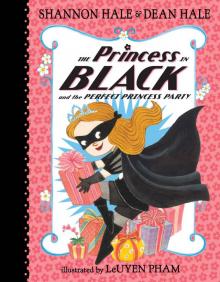 The Princess in Black and the Perfect Princess Party
The Princess in Black and the Perfect Princess Party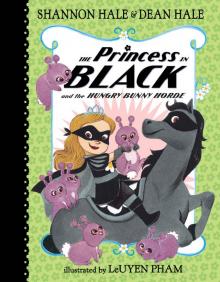 The Princess in Black and the Hungry Bunny Horde
The Princess in Black and the Hungry Bunny Horde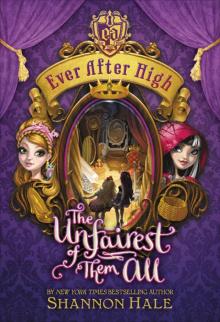 The Unfairest of Them All
The Unfairest of Them All Forest Born
Forest Born 2 Fuzzy, 2 Furious
2 Fuzzy, 2 Furious The Actor and the Housewife
The Actor and the Housewife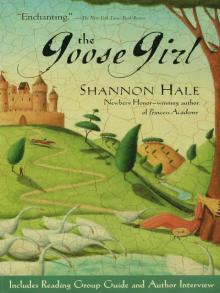 The Goose Girl
The Goose Girl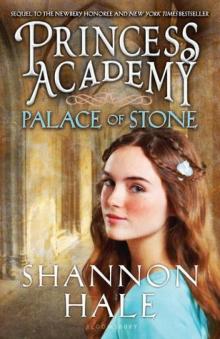 Palace of Stone
Palace of Stone Midnight in Austenland
Midnight in Austenland Enna Burning
Enna Burning Dangerous
Dangerous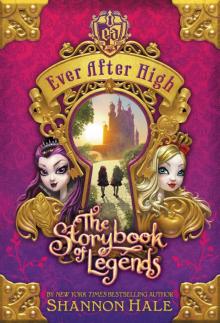 The Storybook of Legends
The Storybook of Legends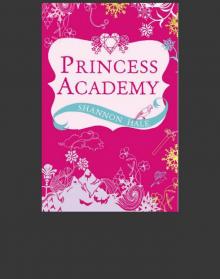 Princess Academy
Princess Academy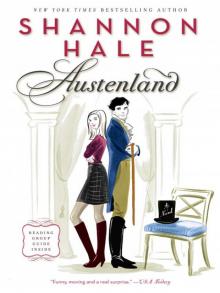 Austenland
Austenland The Forgotten Sisters
The Forgotten Sisters The Unbeatable Squirrel Girl: Squirrel Meets World
The Unbeatable Squirrel Girl: Squirrel Meets World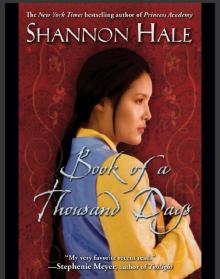 Book of a Thousand Days
Book of a Thousand Days Fire and Ice
Fire and Ice The Princess in Black Takes a Vacation
The Princess in Black Takes a Vacation River Secrets
River Secrets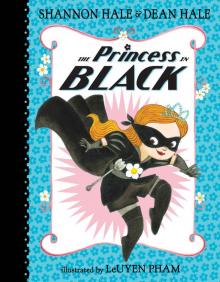 The Princess in Black
The Princess in Black Books of Bayern Series Bundle
Books of Bayern Series Bundle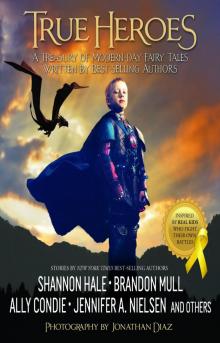 True Heroes
True Heroes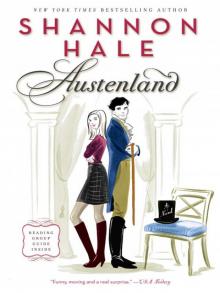 Austenland: A Novel
Austenland: A Novel The Princess in Black and the Science Fair Scare
The Princess in Black and the Science Fair Scare![[Bayern 02] - Enna Burning Read online](http://i1.bookreadfree.com/i1/04/02/bayern_02_-_enna_burning_preview.jpg) [Bayern 02] - Enna Burning
[Bayern 02] - Enna Burning Ever After High
Ever After High Monster High/Ever After High--The Legend of Shadow High
Monster High/Ever After High--The Legend of Shadow High